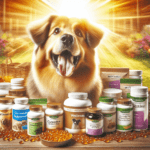
In the article “How to Maintain Your Dog’s Optimal Health,” you’ll discover a friendly and informative guide to keeping your furry friend’s health in top shape. You’ll learn about the importance of regular veterinary visits, proper diet, and the use of health supplements tailored to your dog’s specific needs. The article offers practical tips on improving your dog’s skin, coat, joint, and dental health, regardless of age or breed. From omega-3 fatty acids to probiotics and glucosamine, it covers a variety of natural and organic products that can help support a vibrant, active life for your cherished companion. By following these guidelines, you can ensure your dog enjoys a happy, healthy life by your side. Have you ever wondered how you can keep your dog in tip-top shape? Maintaining your furry friend’s optimal health may seem daunting, but with the right guidance and care, you can ensure they live a long, happy, and healthy life. Let’s dive into the essentials of keeping your dog well.
Understanding Your Dog’s Needs
Taking care of your dog starts with understanding their unique needs. Dogs come in various breeds, sizes, and ages, each with its own set of health requirements. Here, we’ll explore the foundational elements that contribute to your dog’s well-being.
Breed-Specific Health Considerations
Each dog breed has specific health concerns. For instance, large breeds like German Shepherds may be prone to hip dysplasia, while smaller breeds like Chihuahuas often face dental issues. Knowing your dog’s breed-related health risks will help tailor their care.
Common Breed-Specific Health Issues:
| Breed | Health Concerns |
|---|---|
| German Shepherd | Hip dysplasia, elbow dysplasia, digestive issues |
| Golden Retriever | Cancer, heart problems, joint issues |
| Bulldog | Respiratory problems, hip dysplasia |
| Dachshund | Back problems, obesity |
| Chihuahua | Dental issues, heart problems |
Age-Appropriate Care
Puppies, adults, and senior dogs have different needs. Puppies require more frequent vet visits and vaccinations, adults need regular exercise and balanced diets, while seniors might need supplements for joint health and regular screenings for common age-related issues.
Age-Specific Needs:
- Puppies: Frequent vet check-ups, vaccinations, a nutrient-rich diet
- Adults: Regular exercise, balanced diet, and routine health checks
- Seniors: Joint supplements, weight management, screenings for age-related diseases
Essential Nutrients
A complete and balanced diet is crucial for your dog’s health. Their food should provide all necessary nutrients, including proteins, fats, carbohydrates, vitamins, and minerals. Consider the quality of dog food and opt for those that adhere to high standards of nutrition.
Key Nutrients:
| Nutrient | Importance |
|---|---|
| Protein | Muscle growth and repair |
| Carbohydrates | Energy source |
| Fats | Absorption of vitamins, energy, healthy skin |
| Vitamins | Various metabolic processes |
| Minerals | Bone health, enzyme functions, overall well-being |
Health and Well-being
Maintaining your dog’s overall health goes beyond just feeding them the right food. Regular vet visits, vaccinations, and preventive care are crucial components of a healthy lifestyle.
Routine Vet Visits
Regular veterinary check-ups are essential in catching potential health issues early. Annual or bi-annual vet visits can help ensure your dog remains healthy and up-to-date on vaccinations and preventive treatments.
Vaccinations
Vaccinations play a vital role in preventing infectious diseases. Your vet will guide you through the appropriate vaccination schedule for your dog’s age and lifestyle.
Common Canine Vaccinations:
| Vaccination | Purpose |
|---|---|
| Rabies | Protects against rabies, a fatal virus |
| Distemper | Prevents canine distemper, a serious viral illness |
| Parvovirus | Protects against parvovirus, highly contagious |
| Bordetella | Prevents kennel cough |
Dental Health
Oral health is critical to your dog’s overall well-being. Regular dental cleanings and at-home dental care can prevent tooth decay and periodontal disease, which can lead to more serious health issues.

Nutrition and Diet
Diet is a fundamental aspect of your dog’s health. Providing the right nutrition tailored to their specific needs will support their overall well-being and longevity.
Best Dog Food
Choosing the best dog food involves considering your dog’s age, breed, activity level, and health conditions. Some dogs may benefit from grain-free diets, while others might need high-protein or senior-specific formulas.
Supplements and Vitamins
In some cases, dietary supplements can help address specific health issues or deficiencies. Popular supplements include glucosamine for joint health, probiotics for digestion, and omega-3 fatty acids for skin and coat health.
Popular Supplements for Dogs:
| Supplement | Benefit |
|---|---|
| Glucosamine | Supports joint health and mobility |
| Omega-3 Fatty Acids | Promotes healthy skin and coat |
| Probiotics | Supports digestive health |
| Multivitamins | Complements overall nutritional needs |
| Chondroitin | Enhances cartilage health |
Natural and Organic Products
Many dog owners prefer natural or organic products to minimize exposure to synthetic ingredients and preservatives. These can include organic dog food, herbal remedies, and natural flea and tick repellents.
Benefits of Natural Products:
- Reduced risk of allergies
- Better digestion and absorption
- Fewer additives and preservatives
Feeding Tips
To maintain a healthy diet, ensure you’re not overfeeding or underfeeding your dog. Pay attention to portion sizes and follow the feeding guidelines provided by your veterinarian or on the dog food packaging.
Feeding Guidelines:
- Follow age-appropriate schedules (e.g., puppies may need 3-4 meals a day, adults typically need 2 meals)
- Measure food portions to avoid overfeeding
- Keep fresh water available at all times
Physical Health and Exercise
Exercise is vital for your dog’s physical and mental health. It helps maintain a healthy weight, supports joint and muscle health, and provides mental stimulation.
Regular Exercise
Different breeds require varying levels of exercise. While a Border Collie may need extensive daily workouts, a Pug might be happy with shorter, more frequent walks. Consult your vet to determine the ideal exercise routine for your dog.
Benefits of Regular Exercise:
- Maintains healthy weight
- Supports cardiovascular health
- Strengthens muscles and joints
- Provides mental stimulation
Joint and Mobility Health
Joint health becomes increasingly important as dogs age. Providing joint supplements like glucosamine and chondroitin can support your dog’s mobility and prevent or alleviate arthritis symptoms.
Common Joint Supplements:
| Supplement | Benefit |
|---|---|
| Glucosamine | Enhances joint lubrication and cartilage repair |
| Chondroitin | Supports cartilage health and repair |
| MSM (Methylsulfonylmethane) | Reduces inflammation and supports joint health |

Skin and Coat Health
A shiny coat and healthy skin are indicators of your dog’s overall health. Proper grooming, a balanced diet, and supplements can keep their skin and coat in great condition.
Omega-3 Fatty Acids
Omega-3 fatty acids, found in fish oil supplements, are particularly beneficial for maintaining healthy skin and a glossy coat. They also support a normal inflammatory response.
Regular Grooming
Regular grooming helps to remove dirt, spread natural oils, and keep the coat tangle-free. It also provides an opportunity to check for skin issues like fleas or ticks.
Grooming Tips:
- Brush your dog regularly to prevent mats and tangles
- Bathe your dog with a gentle, pet-safe shampoo
- Trim your dog’s nails to prevent discomfort and injury
Mental Health and Stimulation
Just like physical health, mental health is crucial for a well-rounded and happy dog. Mental stimulation through training and play helps to keep your dog engaged and prevents behavioral issues.
Training and Socialization
Training and socializing your dog from a young age ensures they become well-behaved and adaptable adults. Positive reinforcement techniques are effective and strengthen the bond between you and your pet.
Training Tips:
- Use positive reinforcement (treats, praise) to encourage good behavior
- Socialize your dog with other pets and people to build confidence
- Enroll in training classes for structured learning
Interactive Toys
Interactive toys and puzzles can keep your dog mentally stimulated. These toys challenge their problem-solving skills and keep them entertained.
Types of Interactive Toys:
- Puzzle feeders
- Treat-dispensing toys
- Interactive fetch toys

Preventive Health Care
Preventive care is about taking proactive steps to keep your dog healthy. From vaccinations to regular screenings, these measures are vital to preventing diseases and catching health issues early.
Parasite Control
Regular treatments for fleas, ticks, and worms are essential for your dog’s health. These parasites can cause serious health issues if left untreated.
Regular Screenings
Routine health screenings, such as blood tests and dental exams, help detect potential problems early, ensuring timely intervention.
Dental Cleanings
Professional dental cleanings performed by your veterinarian can prevent periodontal disease, which can lead to more serious health problems.
Creating a Safe Environment
Your dog’s environment plays a significant role in their health and well-being. Ensuring that their living space is safe, clean, and comfortable is paramount.
Safe and Clean Living Area
Regularly cleaning your dog’s living area prevents the buildup of harmful bacteria and reduces the risk of infections. Make sure they have a comfortable place to sleep and fresh water available at all times.
Temperature Control
Dogs are sensitive to extreme temperatures. Ensure your dog has a cool place to relax during the summer and a warm, cozy spot in the winter.
Conclusion
Maintaining your dog’s optimal health involves understanding their unique needs, providing balanced nutrition, ensuring regular exercise, and offering preventive care. By following these guidelines and regularly consulting with your veterinarian, you can help ensure your furry friend remains happy, healthy, and full of life.
Your dedication to your dog’s well-being is commendable, and with a little effort and knowledge, you can provide them with the best life possible. Remember, a healthy dog is a happy dog!







